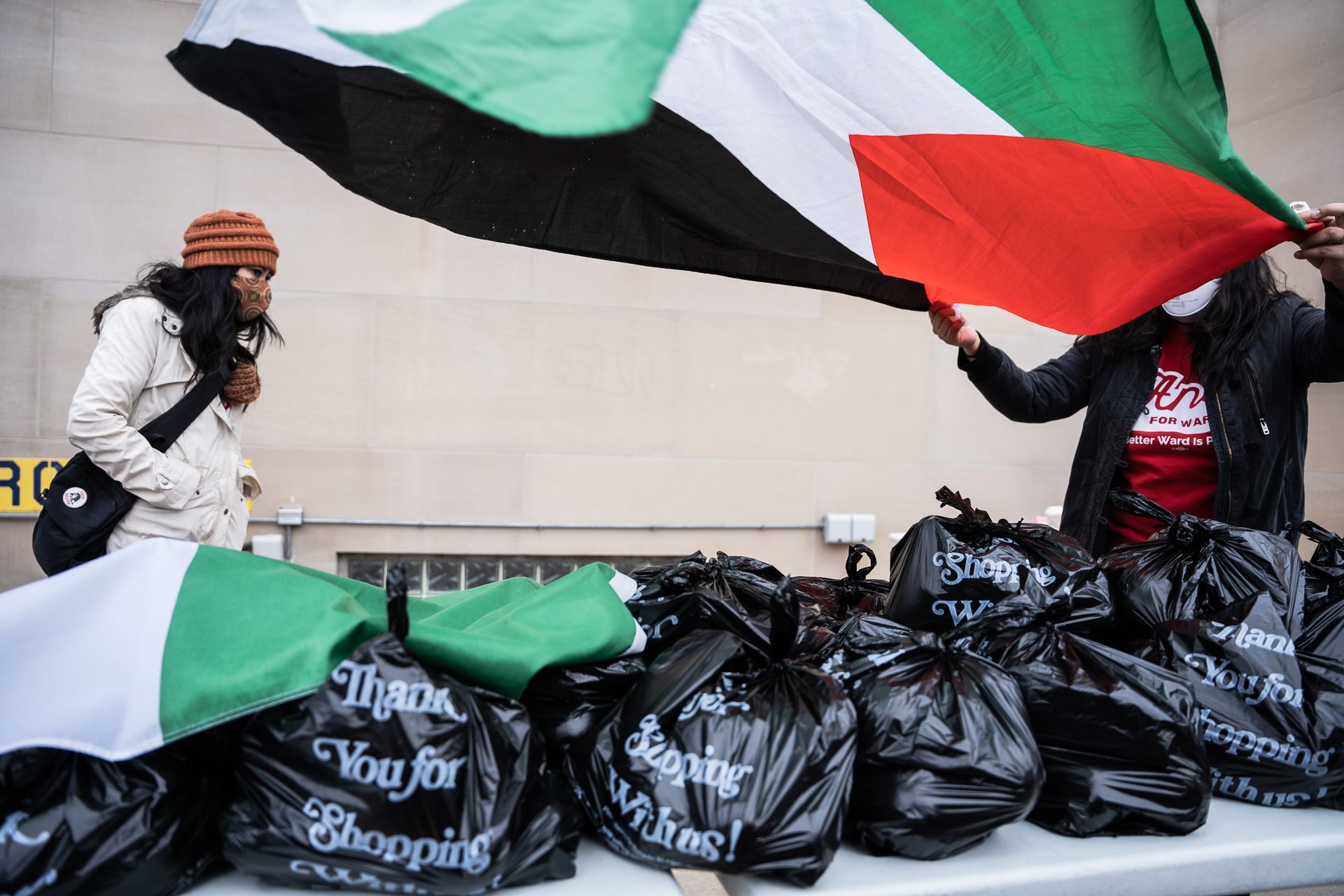 Photo by Sebastián Hidalgo for Borderless Magazine
Photo by Sebastián Hidalgo for Borderless MagazineAs Gov. Pritzker declares an end to the public health emergency brought on by the pandemic and subsequent relief funds, four community-led efforts work to make sure their neighbors’ needs are still met.
On a recent chilly Monday morning, Nicolas Hernandez walked through the door of Casa Hernandez in Humboldt Park after visiting with the staff at Café Calidá, a coffee shop he frequents down the street. The vibrant blue walls of the storefront were teemed with shelves of canned beans, vegetables, soups and chips. The warmth of the store was welcoming. Throughout the shop were racks and tables of summer clothes and shoes. Signs reading “COMIDA GRATIS – FREE FOOD” and “qué hacer si la migra está en su puerta” hung from the fridge in the corner of the room.
“When you come in here, we’re going to help you as best as we can, however we can,” said Hernandez.
Everything in Casa Hernandez is free for whoever needs it. And lately, Hernandez says, more people than ever need their services and support. As more immigrants are arriving from Texas and the city struggles to provide resources and shelter, community groups are struggling to keep up.
“We’re being asked to help more, but we’re already stretched out a lot,” said Hernandez.
Want to receive stories like this in your inbox every week?
Sign up for our free newsletter.

Hernandez is one of five organizers that run the Humboldt Park Solidarity Network, a grassroots support system in Humboldt Park that runs Casa Hernandez. It was established during the early days of the COVID-19 pandemic. The Casa operates as both a free store and as a gathering space for activities like live music, children’s art classes, art shows and community group meetings.
But more than three years since COVID-19 began, community-led groups like the Humboldt Park Solidarity Network are facing increasing challenges, including the rising cost of goods due to inflation and fewer donations compounded by the end of pandemic relief assistance, while attempting to manage a greater need for help from their neighbors.
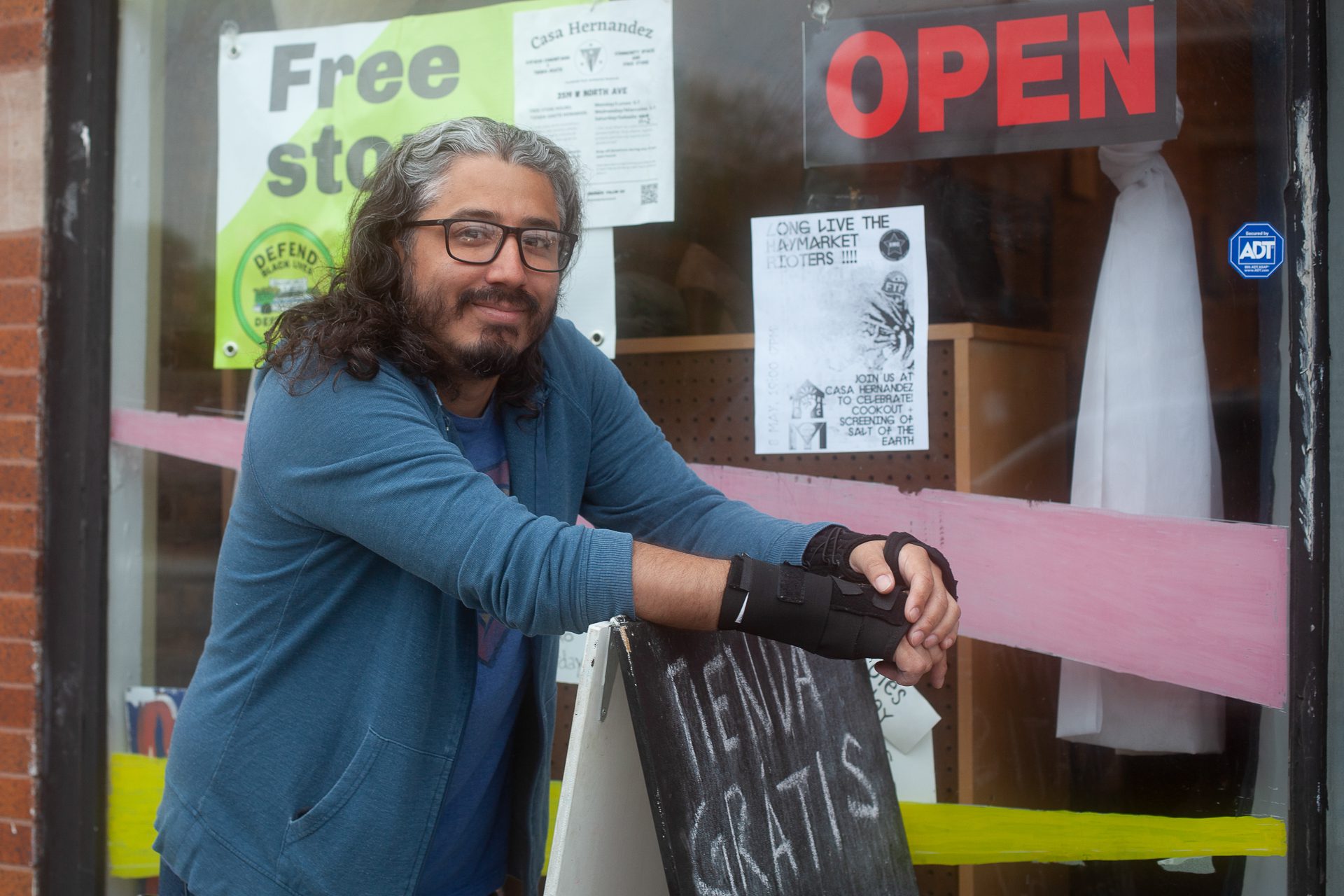
In recent months, many pandemic-related government assistance programs have come to an end.
For immigrants, especially those without documentation, the issue can be even more serious, as many aren’t eligible for government programs like food assistance or Medicare. Migrants arriving from the border in recent months, for example, are unable to work legally and must rely on the support of Chicagoans for basics like food, clothing and shelter.
But the rising need for help has not been met with an increase in donations. In fact, community organizers Borderless spoke to said that the messaging around the “end of the pandemic” and the end of an economic crisis has diminished donations in recent months. Food banks and free stores are noticing a decline in monetary donations, as well as challenges around inflated cost of necessities, like produce, bread and eggs. The issue is especially challenging for those organizations that are not registered as nonprofits and must fully rely on community-driven support.
“We’ve seen a slowing of the momentum that was very, very acute and an exponential increase at the beginning of the pandemic,” said Joy Messinger, an organizer for the Rogers Park Free Store, a community support program that provides personal items, toiletries, baby supplies and cleaning supplies to their North Side neighbors. “The pandemic is still ongoing. The economic impacts of the pandemic are still ongoing, regardless of the narratives in the media and in the government.”
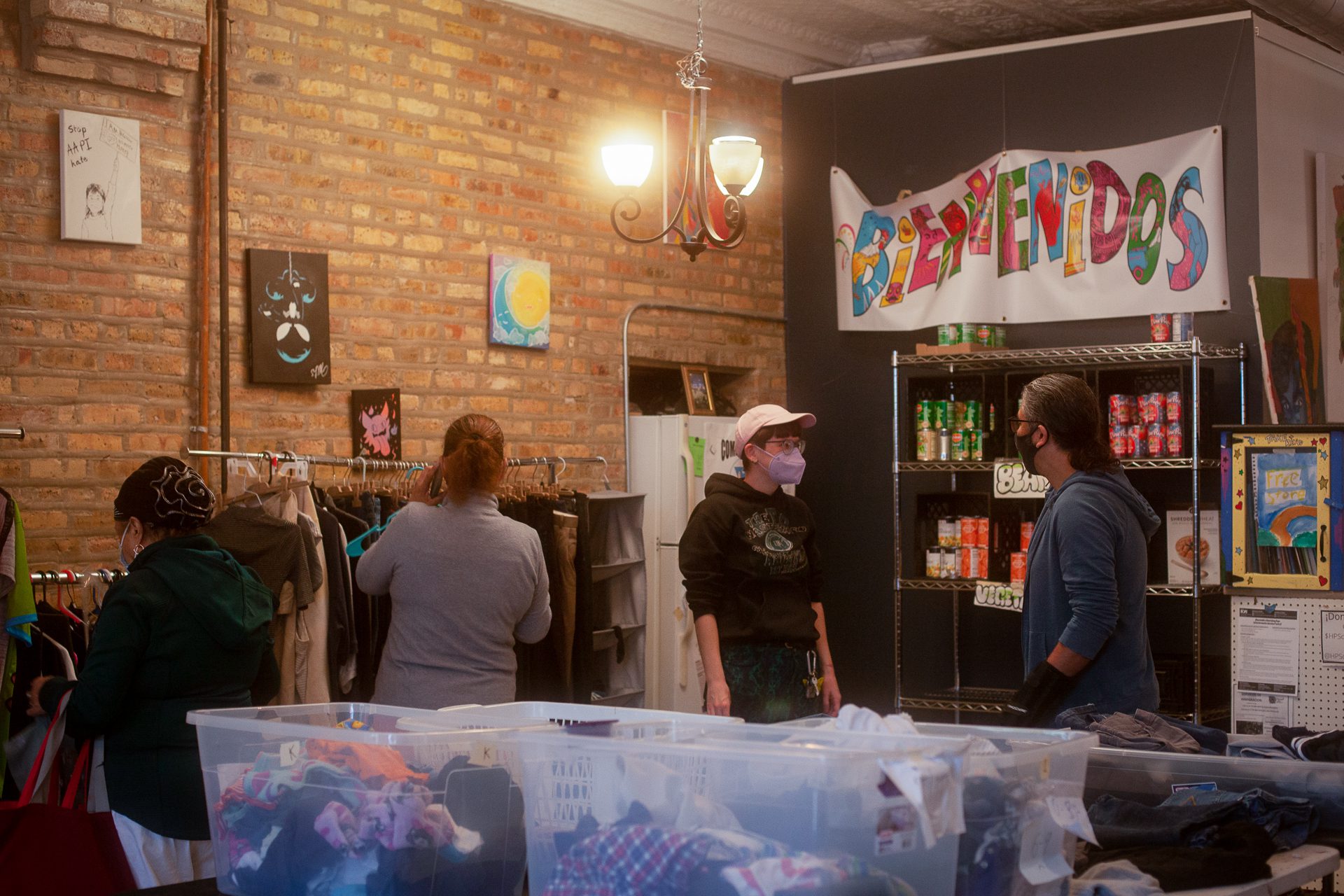
Community Investment
Groups like the Rogers Park Free Store and the Humboldt Park Solidarity Network consist of community members working to help neighbors through direct response. They typically provide clothing, food, health resources and other necessities to families and individuals. They listen to and advocate for their neighbors, and focus on fostering relationships to provide resources. All support, donations and organizing is done by the community, for the community.
Borderless has indexed 32 mutual aid or community resource groups around Chicago, many of which originated due to the heightened need for assistance during the pandemic.
“We are rooted in solidarity, not charity,” said Gerardo Mircino, a founder of the Rogers Park Free Store. “We are a diverse group of people, we have a lot of immigrants among us and we go by the motto that we take care of each other.”
Mircino told Borderless that in early 2021, community members donated their Pandemic Electronic Benefit Transfer (P-EBT) debit cards to the Free Store to help purchase food and snacks. These debit cards were originally given to over one million children around the city to help with food insecurity during the onset of the pandemic. To Mircino, this was a core display of how community members work to support each other.
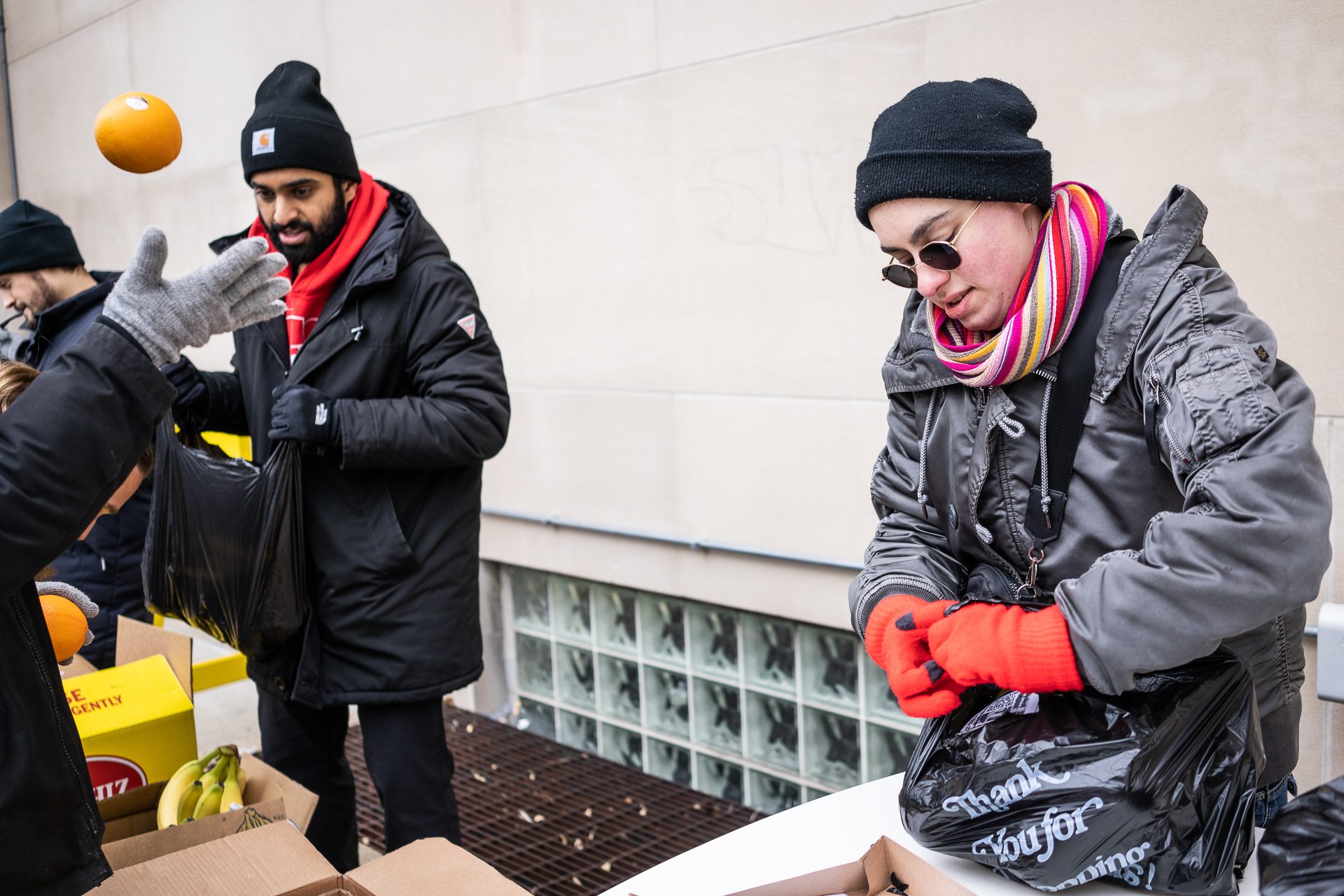
Pueblo Unido Albany Park (PUAP) has a similar approach to community involvement and assistance. “We aren’t a charity by any means,” said Candice Choo-Kang, a founding member of PUAP. “We’re about building power in the neighborhood and really empowering the community to organize themselves, and showing them who keeps them safe. A lot of what we do isn’t just about giving out food, but also really helping raise the political consciousness and the organization of our community members.”
PUAP serves the Albany Park community both by providing their neighbors with the resources they need, and ensuring that they understand how socioeconomic challenges affect all members of the community, even when they don’t see parallels among them.
“They’re not always paying attention to crossovers [in struggles] by design because the system separates us,” said Kelly Staniunas, another founding member of PUAP. “We’re trying to help our neighbors realize those connections and invite them to be part of taking action against injustice.”
Community organizers say that building up these types of relationships helps to make the community stronger and encourages neighbors to care for one another, despite systemic obstacles that could prevent those connections from forming.
Persistent Challenges
The nature of grassroots organizations often means they don’t receive help from local government aid or federal grants, unlike faith or nonprofit organizations that provide similar support. Many are founded due to immediate community need, meaning scrupulous records and reporting are difficult to maintain — a requirement for establishing 501(c)(3) nonprofit status.
During the height of the pandemic, undocumented immigrants were among the most vulnerable, as many were not eligible to access government assistance benefits like Supplemental Nutrition Assistance Program (SNAP), medicare or medicaid, or unemployment benefits.
The areas that these grassroots groups serve are highly diverse communities, and many of the organizers are immigrants themselves. They work to provide resources to those that the government won’t assist, and they build trust so that everyone feels cared for and knows they have a place to turn for help.
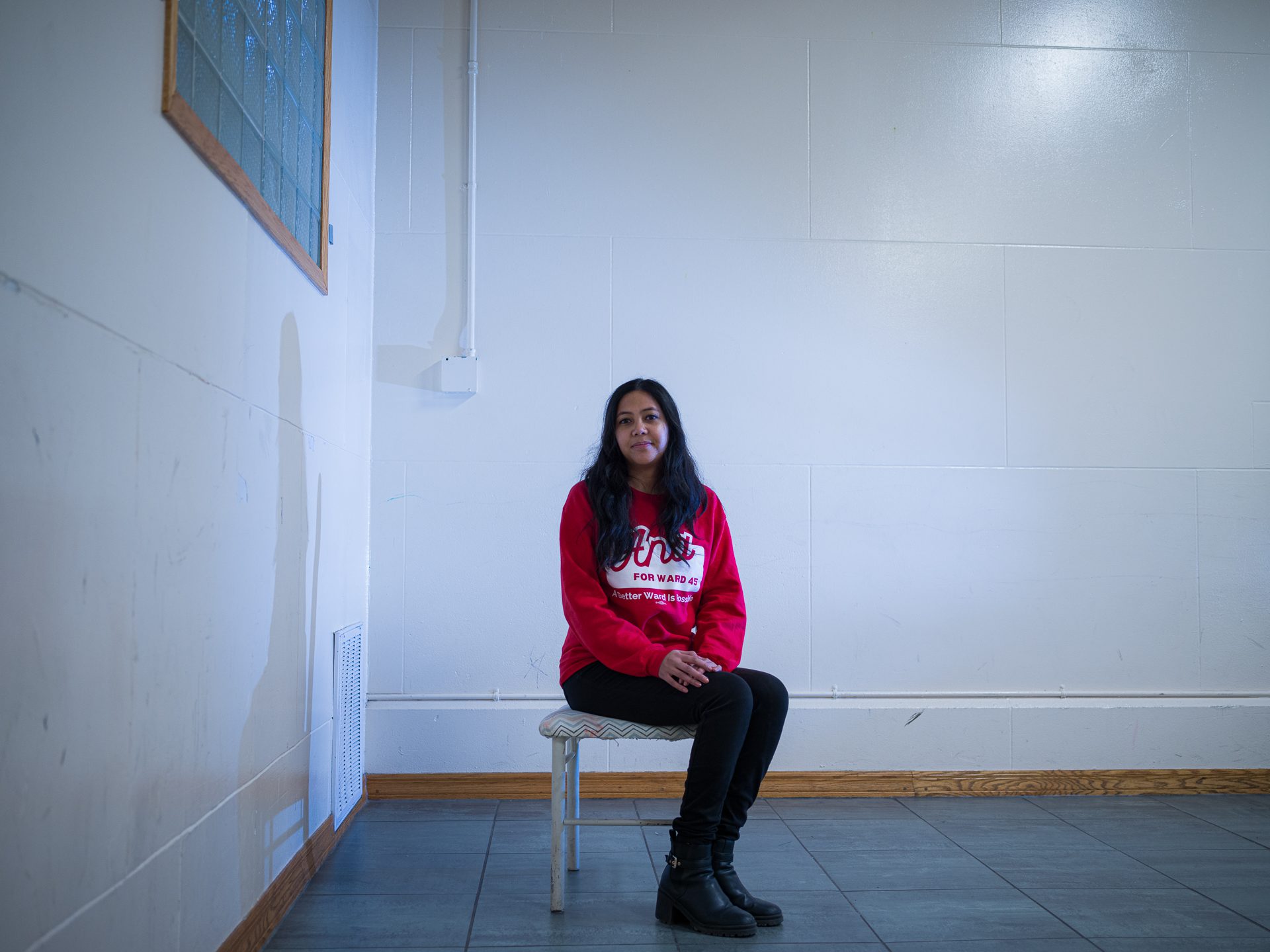
“A lot of the families we serve don’t have the same access to receive benefits directly so we’re serving as a buffer,” said PUAP’s Staniunas. “Over these past few years, we’ve been able to build some trust so that people understand that we’re not putting them at risk because they show up for food.”
The challenges can feel overwhelming. Hernandez says he’s recently been struggling as he works to supply his neighbors with all that they need.
“There are good things, but the bad things are the burnout,” said Hernandez. “It gets to a point where you’re constantly seeing things and saying, ‘I want to do better, but the funding’s not there and resources are not available.’”
Read More of Our Coverage
Intensifying Food Insecurity
Down the street from Casa Hernandez is a food pantry called La Casa Norte Humboldt Park Community Center that opens at 11 a.m. on Mondays. As Hernandez walked by just before 11, the line was down the block.
“That line keeps getting bigger and bigger,” said Hernandez. He receives SNAP benefits because he is on Medicare, so he sometimes visits La Casa Norte and stands in line with his neighbors. He recently got a letter that said his COVID-19 SNAP benefits were being reduced from around $150 to just $20.
A national Census Bureau survey from last summer revealed 11.5% of households sometimes or often did not have enough to eat, a 41% increase from 2021. Locally, in January of this year, The Greater Chicago Food Depository’s partner network served 36% more households than in January 2022. This need is expected to continue to grow.
“I have folks from the neighborhood telling me, ‘Hey, what are we going to do?’” said Hernandez.
Bridging the Funding Gap
In order to make sure their neighbors continue to be taken care of — without relying on government aid — some organizations are having to get creative with how they fund their efforts.
“We had to figure out a way to make the program go without depending on funds and grants,” said Taryn Randle, cofounder of Farm, Food, Familias, a mutual aid network focused on food insecurity.
Since May of 2020, they’ve worked with local chefs and volunteers to prepare and deliver 350 meals a week to over 100 families across Englewood, Little Village and South Chicago neighborhoods. They are currently offering a meal prep fundraiser to support their program, enlisting the help of additional community groups and community members. Interns from Grow Greater Englewood work alongside chef Roberto Pérez of Urban Pilón — a partner of Farm, Food, Familias — out of Let Us Breathe Collective’s kitchen space.
Read More of Our Coverage
They’re also hosting a five-session virtual cooking class with chef Pérez to raise additional funds, and they plan to launch a cookbook this fall.
“We’re committed to figuring out how we can sustain ourselves beyond government support,” said Randle.
And though Humboldt Park Solidarity Network doesn’t receive government aid, Hernandez frequently addresses his local alderman and government officials to let them know exactly what needs aren’t being met and encourages his neighbors to do the same.
“We can go up the ladder and start asking for these benefits, showing folks that this is the situation,” said Hernandez. “We have elected officials and they’re the ones that are getting paid to make sure resources are organized and spread out properly. We’re a resource, we’re not supposed to be the safety net.”
The Pandemic Rages On
While Gov. Pritzker has announced the end of Illinois’ public health emergency to align with the federal government’s timing on May 11, the pandemic and its lingering effects are still far-reaching. As of May 7, 2023, the Illinois Department of Public Health’s 7-day average of weekly new cases was 29 per 100,000 and individuals continue to suffer with long COVID-19 symptoms.
The rhetoric that the pandemic has ended has created additional challenges for mutual aid groups trying to make ends meet.
Staniunas said that PUAP saw a significant drop in donations as the messages around COVID-19 became less critical. “There was a more regular interest of people looking for ways to contribute, but that’s dropped off,” said Staniunas.
While the news of more migrants being sent to Chicago from Texas has helped stir up some donations, organizers say it’s still far from enough to serve the people who are coming to them for help.
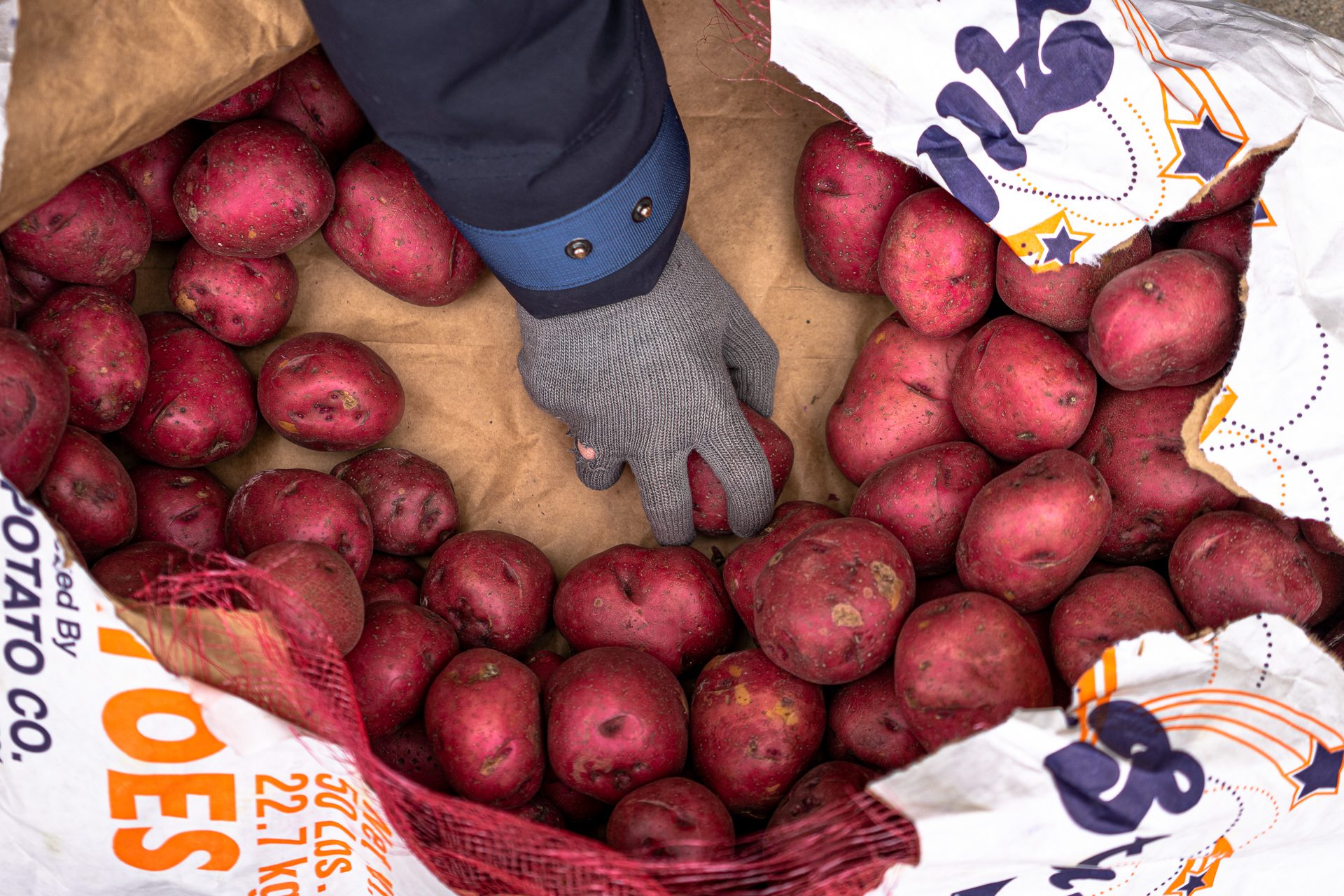
The trickle-down of the sunsetting of government pandemic aid affects access to medical care related to COVID-19, as well.
Choo-Kang said that at the peak of COVID-19, three different medical groups had reached out to assist PUAP in providing the community with testing and vaccinations, but it’s since become increasingly difficult to find those resources, too.
Randle acknowledged the burden that the sunsetting of relief funds will place on the organizations and individuals that benefited from them.
“The seriousness and the support that was generated because of the pandemic has dissipated, and it’s really screaming out how badly people who have needed the support that came about during the pandemic still need it,” said Randle. “It’s really unfortunate that so many people are going to be losing a lot of support that they’ve been using these last few years and that they probably needed long before.”
Learn more about how to help the community organizations and networks in this story:
Humboldt Park Solidarity Network
Most needed: cash, food, people power, blankets, undergarments, hygiene products
Rogers Park Free Store
Most useful: cash
Also needed: diapers and wet wipes; blankets and hygiene products.
Pueblo Unido Albany Park
Message (312) 248-4598 to coordinate drop-offs or volunteer opportunities.
Also needed: monthly donations, smaller long term donations. $10 serves a family
Farm, Food, Familias
Most needed: cash, gardening supplies and aprons.
Items listed are most needed at time of publication. Please contact organizations directly to stay up to date on how best to help.

Bring power to immigrant voices!
Our work is made possible thanks to donations from people like you. Support high-quality reporting by making a tax-deductible donation today.
